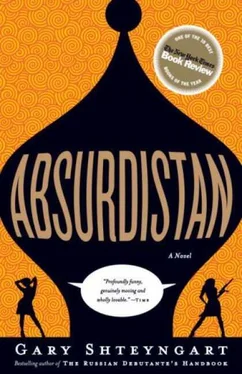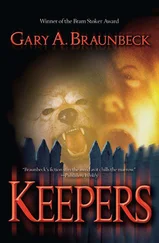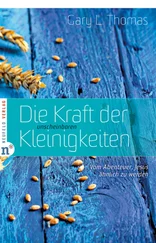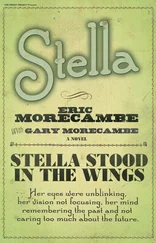I chased away the servants, threatening to beat them over the head with my shoe (it’s a little pantomime I do with the staff; they seem to enjoy it). “Thanks for FedExing me the fabric softener sheets, Rowie,” I said. “We don’t have the good kind here. I can’t get enough of this ‘outdoor fresh scent.’”
Rouenna was looking over the control panel of the new washing machine I had airlifted out of Berlin. “How does this work, boy-o?”
“The instructions are in German.”
“Duh, I can see they’re not in English. Show, don’t tell.”
“What?”
“Show, don’t tell.”
“Meaning what?”
“It’s something Professor Shteynfarb always says in my fiction class. Like instead of expositing about something, you just gotta come out and say it.”
“You’re taking a writing class with Jerry Shteynfarb ?”
“You know him, spuds? He’s awesome. He says I have a really authoritarian voice. And you got to have an authoritarian voice to write phat fiction.”
“He said what ?” I dropped a tub of detergent on my sweaty left foot. The toxic hump shot a jolt of despair across my body, filling my mouth with what tasted like bad medicine. I immediately saw Rouenna and Shteynfarb together in bed.
Let me give you an idea of this Jerry Shteynfarb. He had been a schoolmate of mine at Accidental College, a perfectly Americanized Russian émigré (he came to the States as a seven-year-old) who managed to use his dubious Russian credentials to rise through the ranks of the Accidental creative writing department and to sleep with half the campus in the process. After graduation, he made good on his threat to write a novel, a sad little dirge about his immigrant life, which seems to me the luckiest kind of life imaginable. I think it was called The Russian Arriviste’s Hand Job or something of the sort. The Americans, naturally, lapped it up.
“You got beefs with Professor Shteynfarb?” Rouenna asked.
“I’m just saying be careful. He’s got a reputation in certain New York circles for being very promiscuous. He’ll sleep with anybody.”
“And I’m ‘anybody’?” Rouenna banged shut the washing machine lid.
“You’re somebody,” I whispered.
“Well, Professor says I got a real story to tell, not like the usual crap about rich whiteys getting divorced in Westchester. I’m writing a story about how they burned down our building in Morrisania.”
“I thought you were studying to become a secretary,” I said. “A powerful executive secretary.”
“I’m broadening my mind, just how you axed me to,” Rouenna said. “I don’t want to just be educated, I want to be smart.”
“But Ro—”
“No ‘buts,’ Snack. I’m sick of you acting like you know what’s best for me. You don’t know shit.” To make her point, she jammed her fist in my mouth. “Now, what the fuck this German thing say?”
I removed her fist and gently cleaned off my saliva with a passing sheet of fabric softener. I wanted to show, not tell, her how much I loved her, but I found myself impotent and weak, full of words and little else. “ Kalt means cold, and heiß means hot,” I explained.
She clicked the dial, and the laundry machine started to rattle in contention. She looked into my blue eyes. “Of course I love you, idiot,” she said. And with the effortless bounce of a still-young person, she lifted herself up on her stubby toes, took me by the ears, and slowly showed me how.
8

Only Therapy Can Save Vainberg Now
For two weeks following Rouenna’s departure, I lay on my Mies van der Rohe daybed, doing nothing but waiting for Dr. Levine to return from his conference in Rio de Janeiro. One afternoon, as if planning my revenge for Rouenna’s possible amour fou with the evil Jerry Shteynfarb, I baited a pair of Asiatic university students conducting a census into riding on top of me for about five minutes each. They were from some godforsaken Eskimo province, but they smelled, in a perfectly Russian manner, of dill and sweat. Some multiculturalism! Even our Asians are Russian. The census form was more shocking still. Apparently we now live in a country called “The Russian Federation.”
July came around, and I realized that I was looking at the two-year anniversary of my internment in Russia. Two years? How had it come to pass? I had arrived in July 1999, ostensibly to visit my father for the summer, completely unaware that he was about to murder an Oklahoma businessman over a 10 percent stake in a nutria farm. But that’s not entirely true. From the moment I bought my ticket, I had a premonition I wasn’t returning to New York anytime soon.
You know, this happens a lot to Russians. The Soviet Union is gone, and the borders are as free and passable as they’ve ever been. And yet, when a Russian moves between the two universes, this feeling of finality persists, the logical impossibility of a place like Russia existing alongside the civilized world, of Ann Arbor, Michigan, sharing the same atmosphere with, say, Vladivostok. It was like those mathematical concepts I could never understand in high school: if, then. If Russia exists, then the West is a mirage; conversely, if Russia does not exist, then and only then is the West real and tangible. No wonder young people talk about “going beyond the cordon” when they talk of emigrating, as if Russia were ringed by a vast cordon sanitaire. Either you stay in the leper colony or you get out into the wider world and maybe try to spread your disease to others.
I remember coming back. A rainy summer day. The Austrian Airlines plane dipped its left wing, and through the porthole I caught first sight of my homeland after close to ten years of living in the States.
Let us be certain: the Cold War was won by one side and lost by another. And the losing side, like any other in history, had its countryside scorched, its gold plundered, its men forced to dig ditches in faraway capital cities, its women conscripted to service the victorious army. From my plane window, I saw defeat on the ground. Wind-strewn, deserted suburban fields. The gray shell of a factory sliced in two by some unnameable force, its chimney leaning precariously. A circle of seventies apartment houses, each sinking toward the circular courtyard that separated them, like old men huddled together in conversation.
There was defeat on the faces of the Kalashnikov-toting boys who guarded the dilapidated international terminal, ostensibly from the rich passengers of our Austrian Airlines flight. Defeat at Passport Control. Defeat at Customs. At the curbside line of sad men with battered Ladas begging to ferry us into town for hard currency, defeat. Yet on Beloved Papa’s face, prune-dry, oddly sober, infused with a misbegotten familial glow, there was something like incumbent victory. He tickled my stomach and made a manly poke at my khui. He pointed proudly at the armada of Mercedeses ready to ferry us to his four-story kottedzh on the Gulf of Finland. “Not bad, these new times,” he said to me. “Like an Isaac Babel story, but not so funny.”
For his dissident Zionist activities in the mid-eighties (particularly for kidnapping and then peeing on our neighbor’s anti-Semitic pooch in front of the Leningrad headquarters of the KGB), my father had received a two-year sentence. It was the best gift the authorities could have given him. The months he spent in prison were the most important of Papa’s life. Like all Soviet Jews, Papa had been trained as a mechanical engineer in one of the city’s second-tier universities, and yet he was a scheming working-class boy at heart, not terribly different from his new criminal cellmates with the greasy necks and unshaven noses. Placed in this element, Papa fronted the gangster talk. He devised all kinds of cigarette-related prison capers. He turned bread crumbs into shoe polish and shoe polish into wine. He smuggled in copies of Penthouse, pasted the centerfolds on the back of a willing inmate with girlish hips and rented him out by the hour. By the time Beloved Papa got out, two things had happened: Gorbachev had graciously called off most of that annoying, unprofitable communism with the long lines and detonating television sets, and Beloved Papa had met everyone he would need to know in his reincarnation as a Russian oligarch. All those Georgians and Tatars and Ukrainians with the sweaty-brow entrepreneurial spirit so beloved by the American consulate. All the Ingush and Ossetians and Chechens with the casual attitude toward public violence that would create the fine explosive Russia we know today. These men could throw a punch, strangle a hooker, fake a customs form, hijack a truck, blow up a restaurant, start a shell company, buy a television network, run for parliament. Oh, they were kapitalists, all right. As for Papa, he had things to offer as well. He had a good Jewish head on him and the social skills of an alcoholic.
Читать дальше













